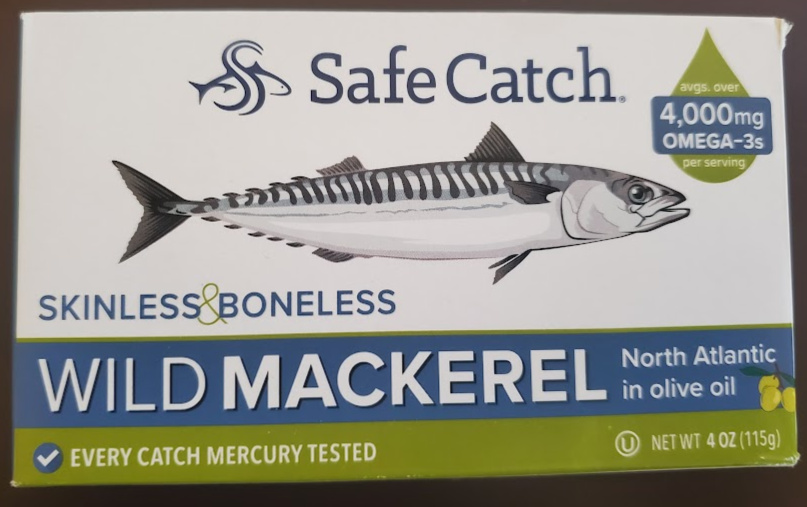Eating fatty fish is recommended in the Mediterranean diet because it is an excellent source of omega-3 fatty acids. It’s especially important for those of us over 50 because it aids in healthy brain function, reduces inflammation, arthritis, and depression, and can even prevent dementia. It can also reduce your risk of heart disease and strokes, and keeps cholesterol levels low.
Women 60 and older should eat at least 1-3 servings of fatty fish or other foods to get their Omega 3s per week.
Fatty fish is a rich source of protein that helps maintain muscle strength. Salmon and trout are known to reduce eye problems such as macular degeneration.
Sardines
Sardines are small oily fish that are packed with nutrients and offer a range of health benefits. They are rich in Omega-3 fatty acids and because they are small fish are naturally low in mercury. Catching them does not harm the environment or deplete fish populations so they are a sustainable fish option.
A delicious way to eat freshly caught sardines is to brush them with olive oil, season them with salt and pepper, and then grill them until the skin is crispy and the flesh is cooked through.
Canned sardines are packed in either oil or water and can be eaten straight from the can or added to salads or sandwiches.
I discovered that putting sardines into a breakfast omelet is a yummy way to start the day.
You can also bake, smoke, or fry them.
Safe Catch canned sardines are a delicious and healthy option for sardine lovers. They are packed in high-quality olive oil which ensures that each bite is full of flavor and nutrition. The fish are caught fresh and canned immediately, ensuring their freshness and quality.
Watch my video review about Safe Catch sardines
Purchase Safe Catch Sardines on Amazon here.
Salmon
Salmon is a highly nutritious fish that contains a wide range of vitamins, minerals, and essential fatty acids. It provides numerous health benefits that include improving heart health, brain function, and overall well-being.
This tasty fish is also high in protein, vitamin B12, vitamin D, and selenium. Protein is essential for building and repairing tissues in the body, while vitamin B12 and vitamin D are important for maintaining healthy bones and immune function. Selenium is an antioxidant that can help protect against oxidative stress and reduce the risk of chronic diseases such as cancer.
Honey Smoked Fish Co. prides itself on its high-quality salmon. It is packed fresh and is sustainably sourced. Its unique honey glaze gives its hickory smoked salmon both a sweet and savory flavor that is irresistible and healthy. The products are low in calories and fat making it an excellent choice if you are trying to lose or maintain your weight.
The company offers delicious salmon stackers which are on-the-go snack boxes. They come in different flavors and include honey smoked salmon, rice crackers, and lemon & chive cream cheese.
Watch my video reviewing Honey Smoked Fish Co. products
You can purchase Honey Smoked Fish Co products in selected stores or on its website.
Mackerel
Mackerel is another seafood source that is high in Omega-3 fatty acids. Eating it canned is especially good because the fish are smaller which makes them lower in Mercury than larger varieties. It also has a tasty flavor. Safe Catch canned mackerel is high quality and sustainably sourced. It can be used in a variety of recipes, including salads, sandwiches, and pasta dishes. Or, you can eat it right out of the can.
Purchase Safe Catch Canned Mackerel on Amazon here.
How vegetarians and vegans can get Omega-3s
Those on a plant-based only diet can get their Omega-3 fatty acids from several sources. One of the best is flaxseeds, which are rich in alpha-linolenic acid (ALA), a type of Omega-3 fatty acid. Chia seeds and hemp seeds are also excellent sources of ALA. Other foods rich in Omega-3s include walnuts, soybeans, and leafy green vegetables such as spinach, kale, and Brussels sprouts.
However, vegetarians and vegans often need to supplement their diets with Omega-3 capsules derived from algae. Fish ingest algae and that’s how they become rich in Omega-3s.
Other sources of Omega-3s include oysters, eggs, avocados, and fish oils.
Are you getting your Omega-3s? Please leave a comment below.




Thankfully, I love salmon so that’s not difficult to include in my diet. I also take an Omega-3 for my eyes, ironically. I’m glad it also helps the heart.
That’s so great to hear, Laurie. Salmon is so good for you.